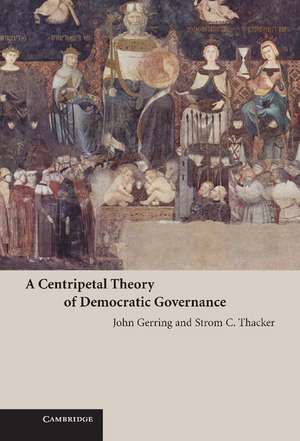A Centripetal Theory of Democratic Governance
Autor John Gerring, Strom C. Thackeren Limba Engleză Hardback – 8 iun 2008
Preț: 444.91 lei
Nou
Puncte Express: 667
Preț estimativ în valută:
85.14€ • 89.30$ • 70.87£
85.14€ • 89.30$ • 70.87£
Carte tipărită la comandă
Livrare economică 01-15 aprilie
Preluare comenzi: 021 569.72.76
Specificații
ISBN-13: 9780521883948
ISBN-10: 0521883946
Pagini: 252
Ilustrații: 16 tables
Dimensiuni: 152 x 229 x 17 mm
Greutate: 0.46 kg
Ediția:1
Editura: Cambridge University Press
Colecția Cambridge University Press
Locul publicării:New York, United States
ISBN-10: 0521883946
Pagini: 252
Ilustrații: 16 tables
Dimensiuni: 152 x 229 x 17 mm
Greutate: 0.46 kg
Ediția:1
Editura: Cambridge University Press
Colecția Cambridge University Press
Locul publicării:New York, United States
Cuprins
1. Models of governance; Part I. Causal Mechanisms: 2. Party government; 3. Conflict mediation; 4. Policy coordination; Part II. Empirics: 5. Hypotheses; 6. Crossnational tests; 7. Assessing the evidence; Part III. Conclusions: 8. In defense of grand theory; Appendix A. Defining good governance; Appendix B. Alternative theories revisited; Sources.
Recenzii
“This is an ambitious project, which asks how the design of democratic institutions affects downstream indicators of government performance, such as corruption, quality of bureaucracy, political stability, rule of law, protection of civil liberties, the capacity to tax, the provision of infrastructure, public health, illiteracy, trade protectionism, and more. Gerring and Thacker advance the controversial argument that institutions that centralize political authority outperform those that decentralize power. Scholars of comparative politics and would-be political reformers alike should take note of this important piece of work.”
-John Carey, Dartmouth College
“This splendid book offers a comprehensive theory, and a wide-ranging set of empirical tests, to explain why some democratic governments work better than others, and it represents is a significant addition to the growing body of evidence in favor or parliamentary government and proportional representation. It will be a touchstone for social scientists, policymakers, and constitution-drafters who are concerned with the role of formal institutions in structuring the tasks of governance.”
-Arend Lijphart, University of California, San Diego
-John Carey, Dartmouth College
“This splendid book offers a comprehensive theory, and a wide-ranging set of empirical tests, to explain why some democratic governments work better than others, and it represents is a significant addition to the growing body of evidence in favor or parliamentary government and proportional representation. It will be a touchstone for social scientists, policymakers, and constitution-drafters who are concerned with the role of formal institutions in structuring the tasks of governance.”
-Arend Lijphart, University of California, San Diego
Notă biografică
Descriere
This book outlines the importance of political institutions in achieving good governance within a democratic polity.
